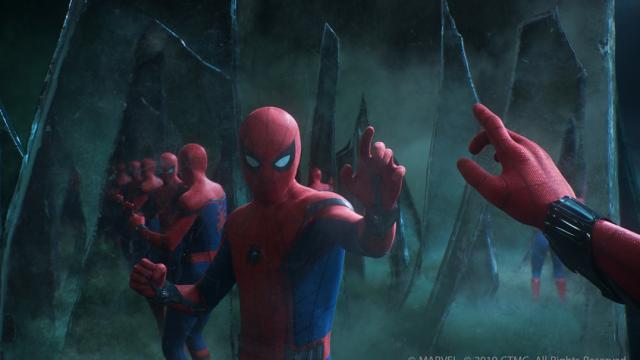Much as audiences might long for Hollywood to change its approach to superhero movies, studios are loathe to let go of the genre’s established hallmarks. So things like glowing MacGuffins and overstuffed’s crossovers are utilised for a variety of reasons — including the simple fact that a lot of people genuinely like them.
It’s easy to dismiss these narrative elements as crutches that the studios use to help stabilise movies that otherwise couldn’t support their own weight because that’s very much been the case with big-budget adaptations of comic books over the years. But another reason filmmakers repeatedly dip back into the well of flashy CGI fights is that they can sometimes work as excellent translations of core parts of the source material that first made those stories compelling to fans.
Regardless of whether it’s in the comics or on the big screen, when executed well, it’s powerful to see Thanos complete his set of Infinity Stones and shove them into his gauntlet in the same way that it’s haunting to see the Justice League come together as friends, only to realise they’ve all got to fight and lose to Superman. Now that Disney and Warner Bros. have become comfortable with team-ups and Deus-ex costume jewellery, though, both studios are venturing into new territory with stories that explicitly involve characters being aware of the existence of multiverses — multiple parallel universes simultaneously existing.
Multiverses come part and parcel with mainstream superhero comics where it’s never too long before the characters in whichever prime universe you’re focused on are faced with a foe threatening to destroy reality itself. Overplayed as multiversal events have become in the comics, people come back for them because they tend to provide excellent opportunities for monumental shifts in power dynamics, the introduction of surprising characters, and the promise of fresh starts afterward for people looking for a place to jump into a series. You may recall the CW’s recent superhero crossover, Crisis on Infinite Earths, tackling the multiverse concept and bringing in actors from across DC and Warner Bros’ past adaptations. While none of them stuck around for long, the events led to some subtle differences on the Arrowverse’s landscape moving forward.
But perhaps the most widely-known multiverse story for the public right now is the groundbreaking Spider-Man: Into the Spider-Verse. Before Peter Ramsey, Rodney Rothman, and Bob Persichetti’s animated film, superhero movies generally avoided dealing with different universes mainly because that mode of sprawling storytelling doesn’t usually work on the big screen and can sometimes alienate viewers who aren’t as familiar with comics. But at some point in the recent past, both Marvel Studios and Warner Bros. seemingly came around on the idea of trying to turn one of comics books’ more tricky conventions into box office success.
Everything we know about Sam Raimi’s Doctor Strange in the Multiverse of Madness, Jon Watts’ follow up to Spider-Man: Far From Home, and Andy Muschietti’s The Flash has indicated that the studios are ready to go all-in on parallel realities. This opens up the potential to tackle iconic comic plots like Flashpoint that fans have been clamoring to see in theatres for years (though the CW’s Flash series already delved into it). But something about the sudden pivot to multiverses makes it feel like this specific moment in Hollywood is being driven by a desire for even larger spectacles whose size may be to distract you from the movies’ lack of interesting substance.
[referenced id=”1225071″ url=”https://gizmodo.com.au/2020/06/michael-keaton-could-play-bruce-wayne-again-for-the-flash-movie/” thumb=”https://gizmodo.com.au/wp-content/uploads/2020/06/23/kzjwitrl6en7xji0d9ro-300×169.png” title=”Michael Keaton Could Play Bruce Wayne Again for The Flash Movie” excerpt=”Funny thing about Infinite Earths to could show up.”]
While these sorts of movies require years of planning and coordination to get off the ground, the post-Spider-Verse turn to multiverses feels very much like Marvel and Warner Bros. seeking to tap into what made people love Sony’s take on both Miles Morales specifically, but also the ideas that define Spider-Man. But rather than telegraphing that these new multiversal movies will prioritise more interesting, dynamic characterisations for heroes, the studios have all led with the multiverses themselves — and potential cameos — being the main draw.
When you zoom out and consider them within the context of the real world, Marvel and DC’s respective cinematic universes are at points where large-scale multiversal shifts feel like a significant and urgent heightening of stakes and that’s…interesting to see from both studios, but for different reasons. With the DCEU continuing to be a haphazard mess that occasionally gets things very right, The Flash’s promise of tackling the Speedforce and bringing back a bunch of old Batmen feels like a desperate stunt more than a calculated move.
Marvel’s last two films were about the literal whole of the universe being saved from utter devastation, and then the public being led to believe that Spider-Man — one of the heroes who saved the universe — was responsible for some of the most high-profile acts of terrorism on Earth. Both of those movies were weighty, narrative climaxes that resulted from years of worldbuilding and pacing, and their magnitude made last year’s general lack of cape films feel somewhat like a welcome break for many. The studios all understandably want to ramp things back up in a big way, but a question that’s worth considering is whether multiverses of all things are what to lead with.
As we move into this new age of twisted and remixed realities, it’s going to be important for the studios to understand what while people have always liked the gimmick to varying extents, it can’t be the only thing that they have to offer as they dig deeper into their IP catalogues looking for new projects to launch.
